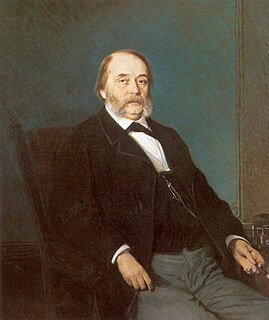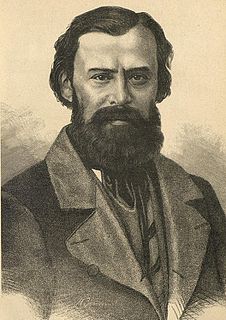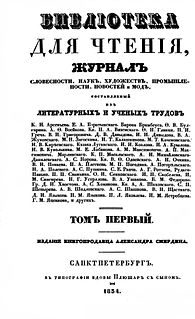
Mikhail Yevgrafovich Saltykov-Shchedrin, was a major Russian satirist of the 19th century. He spent most of his life working as a civil servant in various capacities. After the death of poet Nikolay Nekrasov he acted as editor of the well-known Russian magazine, Otechestvenniye Zapiski, until the government banned it in 1884. His best-known work, the novel The Golovlyov Family, appeared in 1876.

Mikhail Yuryevich Lermontov was a Russian Romantic writer, poet and painter, sometimes called "the poet of the Caucasus", the most important Russian poet after Alexander Pushkin's death in 1837 and the greatest figure in Russian Romanticism. His influence on later Russian literature is still felt in modern times, not only through his poetry, but also through his prose, which founded the tradition of the Russian psychological novel.

Ivan Alexandrovich Goncharov was a Russian novelist best known for his novels A Common Story (1847), Oblomov (1859), and The Precipice (1869). He also served in many official capacities, including the position of censor.

Nikolay Alexeyevich Nekrasov was a Russian poet, writer, critic and publisher, whose deeply compassionate poems about peasant Russia made him the hero of liberal and radical circles of Russian intelligentsia, as represented by Vissarion Belinsky, Nikolay Chernyshevsky and Fyodor Dostoyevsky. He is credited with introducing into Russian poetry ternary meters and the technique of dramatic monologue. As the editor of several literary journals, notably Sovremennik, Nekrasov was also singularly successful and influential.

Afanasy Afanasyevich Fet, later known as Shenshin ; 5 December [O.S. 23 November] 1820 – 3 December [O.S. 21 November] 1892), was a renowned Russian poet regarded as the finest master of lyric verse in Russian literature.

Apollon Nikolayevich Maykov was a Russian poet, best known for his lyric verse showcasing images of Russian villages, nature, and history. His love for ancient Greece and Rome, which he studied for much of his life, is also reflected in his works. Maykov spent four years translating the epic The Tale of Igor's Campaign (1870) into modern Russian. He translated the folklore of Belarus, Greece, Serbia and Spain, as well as works by Heine, Adam Mickiewicz and Goethe, among others. Several of Maykov's poems were set to music by Russian composers, among them Rimsky-Korsakov and Tchaikovsky.

Aleksey Nikolayevich Pleshcheyev was a radical Russian poet of the 19th century, once a member of the Petrashevsky Circle.

Apollon Aleksandrovich Grigoryev ; was a Russian poet, literary and theatrical critic, translator, memoirist and author of popular art songs.

Lev Aleksandrovich Mei was a Russian dramatist and poet.
The Simpleton is the debut novel by Alexei Pisemsky, written in the late 1840 and first published in October and November 1850 by Moskvityanin. The novel has met critical acclaim and made Pisemsky a popular author.

The Vampire is a gothic novella by Aleksey Konstantinovich Tolstoy, first published in Saint Petersburg in 1841 under the pseudonym of Krasnorogsky.
Boyarshchina is an early novel by Aleksey Pisemsky. Written in 1844-1846 under the original title Is She to Blame?, it was published only in 1858 in Biblioteka Dlya Chteniya magazine.

Biblioteka Dlya Chteniya was a Russian monthly magazine founded in Saint Petersburg, Russian Empire, in 1834 by Alexander Smirdin.
A Protégée of the Mistress is a play by Alexander Ostrovsky, first published in the No.1, January 1859 issue of Biblioteka Dlya Chteniya. Refused the permission to be produced at the Imperial Theatres in October 1859, it premiered in Maly Theatre, Moscow, only on October 21, 1863.
Two Fates is a poem by Apollon Maykov, first published in 1845 in Saint Petersburg, as a separate edition, under the title "Two Fates. A Real Story by A.N.Maykov" and with considerable censorship cuts. It hasn't been re-issued in the author's lifetime and first appeared in its original form in The Selected Works by A.N.Maykov.
Two Worlds is a tragedy in verse by Apollon Maykov first published in February 1882 issue of The Russian Messenger. It represents the final part of the poetic cycle dealing with the conflict between paganism and Christianity. In 1882 Two Worlds won its author the Pushkin Prize for literature and was hailed as his most prominent work to date.
The Wanderer is a poem by Apollon Maykov, first published in the No.1, January 1867 issue of The Russian Messenger. It was dedicated to Fyodor Tyutchev and subtitled: "First part of the drama The Thirsty One".
Boyarin Orsha is a poem by Mikhail Lermontov, written in 1835-1836 and first published by Andrey Krayevsky in the No.7, 1842, issue of Otechestvennye Zapiski.
The Hypochondriac is a four-act comedy by Alexey Pisemsky first published in Moskvityanin's No. 1, 1851 issue. Stopped by censors in 1852, it premiered on 21 September 1855 in Saint Petersburg's Alexandrinsky Theatre.

Alexander Filippovich Smirdin was a prominent Russian publisher and editor. Smirdin was the first in Russia to start selling books cheap enough to make them accessible to wide readership, and to develop the standard set of financial criteria for paying authors. He maintained strong links with the country's literary elite and, in retrospect, played a key role in the development of Russian literature in the early 19th century. Smirdin published all the best known works by Nikolai Karamzin, Vasily Zhukovsky, Alexander Pushkin, Ivan Krylov as well as numerous textbooks and seminal books on history and science.






















